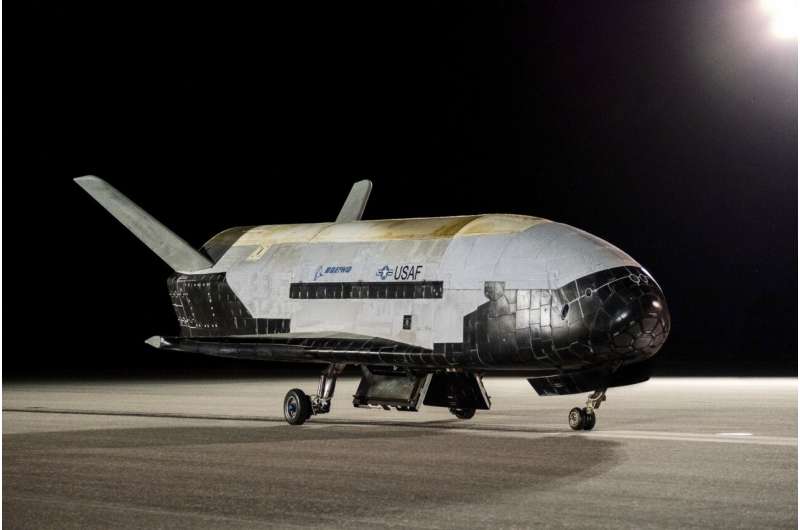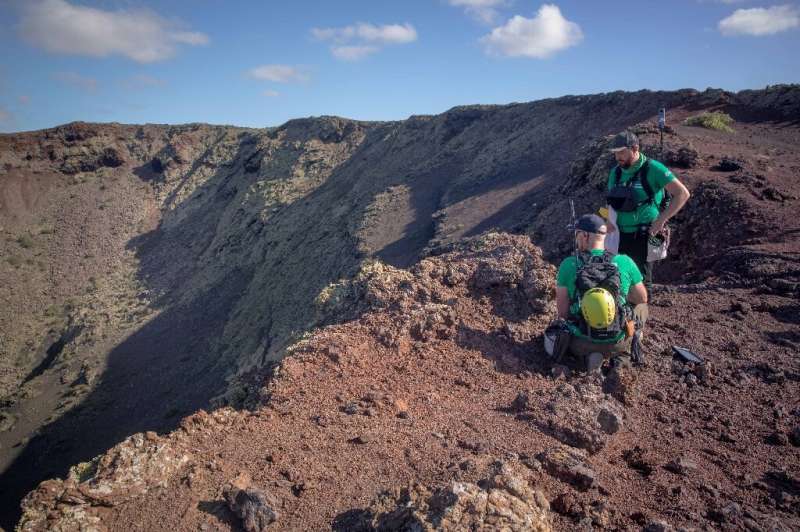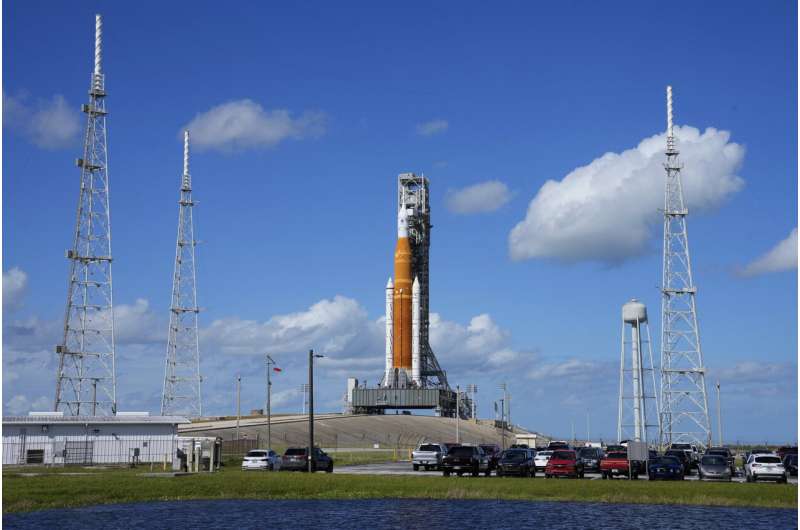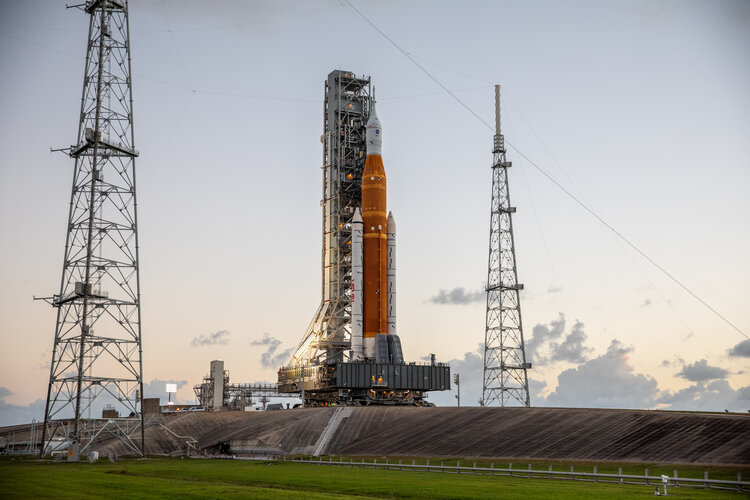
Copernical Team
A rover for Mars' moon Phobos
 The origin of Mars' two moons, Phobos and Deimos, is still unclear. To unravel this mystery, the Japan Aerospace Exploration Agency (JAXA) Martian Moons eXploration (MMX) mission is scheduled to launch in 2024. A German-French rover will be on board to explore the surface of the 27-kilometre-diameter Phobos in detail. The German Aerospace Center (Deutsches Zentrum fur Luft- und Raumfahrt; DLR) h
The origin of Mars' two moons, Phobos and Deimos, is still unclear. To unravel this mystery, the Japan Aerospace Exploration Agency (JAXA) Martian Moons eXploration (MMX) mission is scheduled to launch in 2024. A German-French rover will be on board to explore the surface of the 27-kilometre-diameter Phobos in detail. The German Aerospace Center (Deutsches Zentrum fur Luft- und Raumfahrt; DLR) h Artemis I rocket received only minimal damage from Hurricane Nicole, NASA says
 NASA said Friday it would proceed with the Artemis I launch after inspections showed minimal damage to the rocket from Hurricane Nicole.
The Artemis I mission launch is still scheduled for Nov. 16, after it was delayed due to the Hurricane.
"There's nothing preventing us from getting to the 16th," Jim Free, an associate administrator, told reporters during a Friday news conferenc
NASA said Friday it would proceed with the Artemis I launch after inspections showed minimal damage to the rocket from Hurricane Nicole.
The Artemis I mission launch is still scheduled for Nov. 16, after it was delayed due to the Hurricane.
"There's nothing preventing us from getting to the 16th," Jim Free, an associate administrator, told reporters during a Friday news conferenc Television crew finds remnants of Challenger in Atlantic Ocean
 Divers off the east coast of Florida have discovered remnants from the Space Shuttle Challenger which exploded after liftoff from Cape Canaveral more than 36 years ago.
A television crew inadvertently made the find while searching for the wreckage of a WWII-era warplane at the bottom of the Atlantic.
That's where the dive team noticed a large, flat metal object with distinct 8-in
Divers off the east coast of Florida have discovered remnants from the Space Shuttle Challenger which exploded after liftoff from Cape Canaveral more than 36 years ago.
A television crew inadvertently made the find while searching for the wreckage of a WWII-era warplane at the bottom of the Atlantic.
That's where the dive team noticed a large, flat metal object with distinct 8-in NASA sticks to plan to launch Moon rocket Wednesday
 NASA said Friday it plans to attempt its long-delayed uncrewed mission to the Moon as scheduled next Wednesday, after inspections revealed only minor damage from Hurricane Nicole's passage through Florida.
Jim Free, a senior official at the US space agency, told journalists there was "nothing preventing" a launch on that date, and said that NASA teams had managed to access the launch pad on
NASA said Friday it plans to attempt its long-delayed uncrewed mission to the Moon as scheduled next Wednesday, after inspections revealed only minor damage from Hurricane Nicole's passage through Florida.
Jim Free, a senior official at the US space agency, told journalists there was "nothing preventing" a launch on that date, and said that NASA teams had managed to access the launch pad on Maxar-built Galaxy 31 and Galaxy 32 for Intelsat performing properly after launch
 Maxar Technologies (NYSE:MAXR) (TSX:MAXR), provider of comprehensive space solutions and secure, precise, geospatial intelligence, has announced that Galaxy 31 and Galaxy 32, built for Intelsat, are performing as expected after being launched aboard a SpaceX Falcon 9 rocket from Cape Canaveral, Florida.
These two geostationary satellites will enable Intelsat, operator of the world's larges
Maxar Technologies (NYSE:MAXR) (TSX:MAXR), provider of comprehensive space solutions and secure, precise, geospatial intelligence, has announced that Galaxy 31 and Galaxy 32, built for Intelsat, are performing as expected after being launched aboard a SpaceX Falcon 9 rocket from Cape Canaveral, Florida.
These two geostationary satellites will enable Intelsat, operator of the world's larges US military space drone returns to Earth after 908 days in orbit
 A US military space drone landed at the Kennedy Space Center in Florida on Saturday after nearly two and a half years in orbit, Boeing said.
The unmanned X-37B shuttle, whose first flight took place in 2010, has now spent a total of more than 10 years in space and flown more than 1.3 billion miles during six missions, Boeing said in a statement.
"This mission highlights the Space Force
A US military space drone landed at the Kennedy Space Center in Florida on Saturday after nearly two and a half years in orbit, Boeing said.
The unmanned X-37B shuttle, whose first flight took place in 2010, has now spent a total of more than 10 years in space and flown more than 1.3 billion miles during six missions, Boeing said in a statement.
"This mission highlights the Space Force Unmanned, solar-powered US space plane back after 908 days

'Like the Moon': Astronauts flock to Spanish isle to train

Kneeling on the edge of a deep crater, astronaut Alexander Gerst uses a chisel to collect a sample of volcanic rock which he carefully puts inside a white plastic bag.
Gerst is not on the Moon, even if it looks like it. He is in the middle of Los Volcanes Natural Park on the island of Lanzarote in Spain's Canary Islands, off the northwest coast of Africa.
With its blackened lava fields, craters and volcanic tubes, Lanzarote's geology can be uncannily similar to that of the Moon and Mars—so much so that the European Space Agency (ESA) and NASA have for years been sending astronauts to the island to train.
"This place has lavas that are very, very similar to the ones that we find on the Moon," Gerst, a 46-year-old German astronaut with the ESA, told AFP.
He said the island was "a unique training ground".
NASA: Moon rocket endured hurricane, set for 1st test flight

NASA's moon rocket needs only minor repairs after enduring a hurricane at the pad and is on track for its first test flight next week, a top official said Friday.
"Right now, there's nothing preventing us" from attempting a launch on Wednesday, said NASA's Jim Free, an associate administrator.
The wind never exceeded the rocket's design limits as Hurricane Nicole swept through Kennedy Space Center on Thursday, according to Free. But he acknowledged if the launch team had known in advance that a hurricane was going to hit, they likely would have kept the rocket indoors. The rocket was moved out to the pad late last week for its $4.1 billion demo mission.
Gusts reached 100 mph (160 kph) atop the launch tower, but were not nearly as strong farther down at the rocket.


